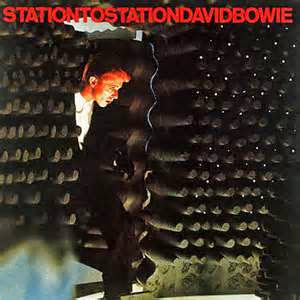Station to Station (AM8)
 Bowie's vocal tour de force is a restless album jumping genres from track to track. The Thin White Duke is like a manic host insisting you see all the city's clubs in just one night. Epic mounds of cocaine-induced genre jitters, they say, but can vocals this restrained and cadenced be achieved in a dopamine frenzy? You wouldn't think. Bowie moves from funk to funky and ties it all up with his WW ballads, "Word on a Wing" and Dimitri Tiomkin's Oscar nominated "Wild is the Wind," which drip with enough melodrama to make Roy Orbison cry. What's missing here? Nothing, and that is the issue. We've got funky, we've got Motorik; it's Philly R&B though Euro-centric. It's Earl Slick and Roy Bitten and Carlos Alomar who said, "It was one of the most glorious albums that we've ever done ... We experimented so much on it," and hardly knew when to stop. NME described it as having "an air of regret for missed opportunities and past pleasures." It's just all over the place: it's great then it's not, then it apologizes and makes up for it, overdoes it again. It was indeed drug-induced genius, but does that belittle it? Face it, Dark Side of the Moon was all the more fabulous because you were just so high. Bowie stated that he only "knew he was in L.A., because he had read that he was in L.A." It's an album that came out of a stupor. So do most of our best memories.
Bowie's vocal tour de force is a restless album jumping genres from track to track. The Thin White Duke is like a manic host insisting you see all the city's clubs in just one night. Epic mounds of cocaine-induced genre jitters, they say, but can vocals this restrained and cadenced be achieved in a dopamine frenzy? You wouldn't think. Bowie moves from funk to funky and ties it all up with his WW ballads, "Word on a Wing" and Dimitri Tiomkin's Oscar nominated "Wild is the Wind," which drip with enough melodrama to make Roy Orbison cry. What's missing here? Nothing, and that is the issue. We've got funky, we've got Motorik; it's Philly R&B though Euro-centric. It's Earl Slick and Roy Bitten and Carlos Alomar who said, "It was one of the most glorious albums that we've ever done ... We experimented so much on it," and hardly knew when to stop. NME described it as having "an air of regret for missed opportunities and past pleasures." It's just all over the place: it's great then it's not, then it apologizes and makes up for it, overdoes it again. It was indeed drug-induced genius, but does that belittle it? Face it, Dark Side of the Moon was all the more fabulous because you were just so high. Bowie stated that he only "knew he was in L.A., because he had read that he was in L.A." It's an album that came out of a stupor. So do most of our best memories.The myth that is the Berlin Trilogy (Low was recorded in France and Lodger in Switzerland) tends to negate this author's insistence that Station to Station, Low and Heroes are a continuum and a much more cohesive trilogy. Lodger is a different album altogether, despite its production.
David Bowie was guilty of a lot of AM9s (Diamond Dogs, Hunky Dory, Low), and an AM10 in Ziggy, but Station to Station (AM8) is the little engine that didn't, try as it might. There is too much crammed into 38 minutes – 38 minutes of cocaine bliss. It is just a wee bit too wild in the wind.

Published on September 14, 2020 15:33
No comments have been added yet.



